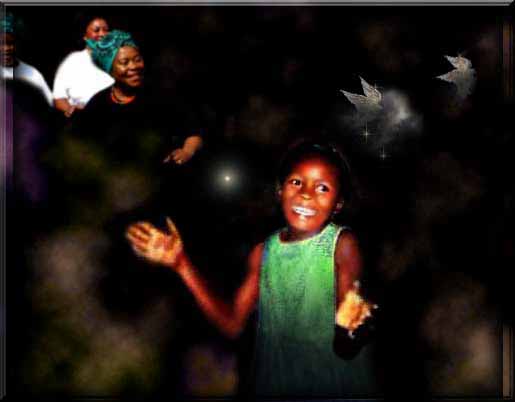
They're Playing Your Song
When a woman in a certain African tribe knows she is pregnant,
she goes out into the wilderness with a few friends and together
they pray and meditate until they hear the song of the child.
They recognize that every soul has its own vibration that
expresses its unique flavor and purpose. When the women
attune to the song, they sing it out loud. Then they return
to the tribe and teach it to everyone else.
When the child is born, the community gathers and sings the
child's song to him or her. Later, when the child enters
education, the village gathers and chants the child's song.
When the child passes through the initiation to adulthood,
the people again come together and sing. At the time of
marriage, the person hears his or her song.
Finally, when the soul is about to pass from this world, the
family and friends gather at the person's bed, just as they
did at their birth, and they sing the person to the next life.
When I have shared this story in my lectures, a fair amount
of people in the audience come to tears. There is something
inside each of us that knows we have a song, and we wish
those we love would recognize it and support us to sing it.
In some of my seminars I ask people to verbalize to a partner
the one phrase they wish their parents had said to them as a
child. Then the partner lovingly whispers it in their ear. This
exercise goes very deep, and many significant insights start
to click. How we all long to be loved, acknowledged, and
accepted for who we are!
In the African tribe there is one other occasion upon which
the villagers sing to the child. If at any time during his or
her life, the person commits a crime or aberrant social act,
the
individual is called to the center of the village and the people
in
the community form a circle around them. Then they sing their
song to
them. The tribe recognizes that the correction for antisocial
behavior
is not punishment; it is love and the remembrance of identity.
When you recognize your own song, you have no desire or need
to do anything that would hurt another.
A friend is someone who knows your song and sings it to you
when you have forgotten it. Those who love you are not fooled
by mistakes you have made or dark images you hold about
yourself. They remember your beauty when you feel ugly; your
wholeness when you are broken; your innocence when you feel
guilty; and your purpose when you are confused.
If you do not give your song a voice, you will feel lost,
alone,
and confused. If you express it, you will come to life. We
attract people on a similar wavelength so we can support each
other
to sing aloud. Sometimes we attract people who challenge us
by telling us that we cannot or should not sing our song in
public.
Yet these people help us too, for they stimulate us
to find greater courage to sing it.
You may not have grown up in an African tribe that sings
your song to you at crucial life transitions, but life is
always
reminding you when you are in tune with yourself and when
you are not. When you feel good, what you are doing matches
your song, and when you feel awful, it doesn't. In the end,
we shall all recognize our song and sing it well. You may feel
a little warbly at the moment, but so have all the great
singers. Just keep singing and you'll find your way home.
By Alan Cohen
author of "Living from the Heart"
|
This was emailed to me, so I am not sure whether it was excerpted from one of his books, or newsletters, or from one of his lectures.
I've been reading Alan's books for years. He is without a doubt one of my favorite authors. Last year I had the great joy of attending one of his seminars at Omega Institute in Rhinebeck, NY, and since then he is also one of my favorite people.
If you ever have a chance to attend one of his lectures or workshops, I strongly encourage you to do so. You can find out more information about him, his books, and his seminars at www.alancohen.com/
  
 
|
|





